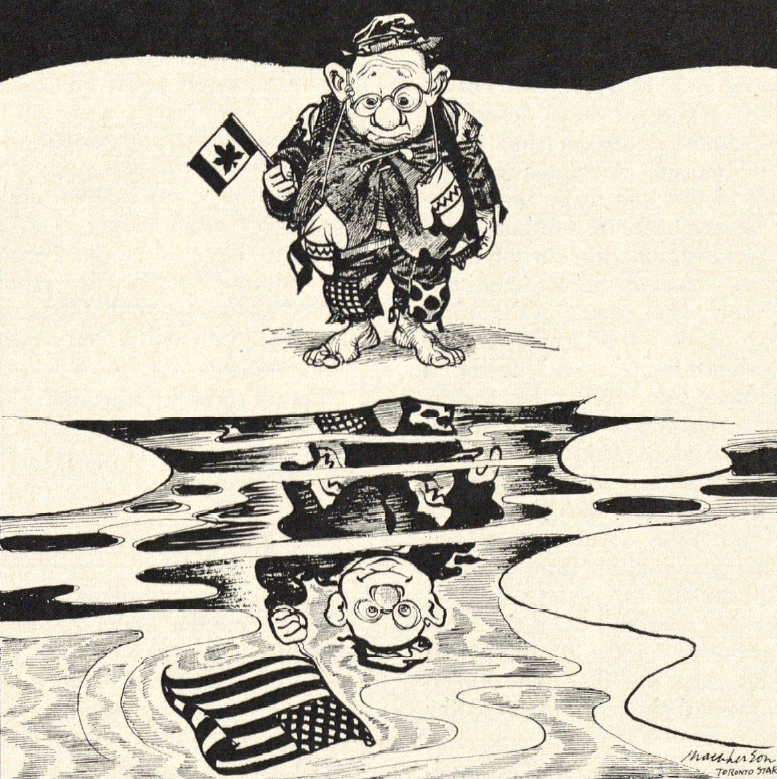On the fear of nationalism
From the May-June 1967 edition of CD

Illustration by Duncan Macpherson
The following is a digitized version of an article from Canadian Dimension’s print archive, which is now available for the first time through the University of Manitoba Digital Collections. It originally appeared in the May-June 1967 edition of CD (Volume 4, Number 4). To preserve these articles as they originally appeared, we do not alter, edit or update them.
Canada is, and has always been, a relatively stable and peaceful society. Our political tradition, in its substantive content and even more in its rhetoric, has emphasized above all, the themes of moderation. The tradition may have served us well in the past, but it must now be transcended if Canada is to survive. Let us not mince words; survival is the issue. The fear of political annexation is not realistic: but the prospect of total economic and cultural integration into American society, is real and immediate.
Our political and intellectual elites, true to the Canadian tradition, are moderately concerned about the impending demise of their country, and moderately determined to do something to prevent that demise, on condition that whatever is done, be moderately done. This moderation will be the death of us. One of the sources of contemporary moderation is a genteel fear of nationalism that pervades the English-Canadian establishment. The continentalist elements of establishment use this fear of nationalism cynically, in the interest of the greater American nationalism of which we are a part.
Simultaneously, in order to draw the teeth of Canadian nationalism they produce a counterfeit nationalism of their own, a centennial nationalism which amounts to no more than a local boosterism: what a wonderful country this is, how lucky we are to he citizens of this blessed land, how proud we are to be Canadians, let’s stop running ourselves down, we have a magnificent future, and so on. In this way, nationalist emotion is drained off to be expressed in harmless flag-waving and in sentimental pap, with no more impact on the process of Americanization than the self-glorification of a small town Chamber of Commerce. American society is broad and flexible enough to accommodate innumerable local patriotisms, from Hawaii to Puerto Rico, so long as they are American.
But there are also elements of the establishment which are not continentalist, which might be prepared to do something if it were not for their genuine fear of nationalism. Americanization, they would agree, is an evil which we ought to avoid if we can, but nationalism is an even greater evil—it is the malevolent force which has bathed the world in blood.
The moderate view is that Canadian nationalism would be more harmful to Canada and to the world than the Americanization of Canada. This view is false because it is based on a model of nationalism which is not applicable to Canada. The nationalism that has bathed the world in blood, is not the nationalism that seeks to prevent the integration of Canada into American society.
There are, to begin with, crucial distinctions to be made among the nationalism of expansionist great powers, the nationalism of small states struggling to preserve some degree of independence and the nationalism of colonized people seeking self-determination. The first of these is never justifiable. The other two, nearly always are. Canadian nationalism is dearly that of the small state: our relationship with the United States is analagous to the relationship of Finland with the Soviet Union. The Americans and the Soviets need not fear conquest by the Canadians and the Finns. The Canadians and the Finns are no threat to their great neighbours. The shedding of blood is simply not in this picture. Second of all, there is a difference between the nationalism that disrupts established states and the nationalism that preserves or consolidates existing states. Examples of the disruptive type are the nationalisms that destroyed the Austro-Hungarian Empire and the nationalisms that today threaten to destroy and dismember India and Nigeria. These nationalisms, though they are often justifiable reactions to alien domination, are usually accompanied by bitter chauvinistic hatred of neighbouring peoples and often result in the shedding of blood. The mutually antagonistic chauvinisms of English and French Canada, are potentially analagous to those of Austro-Hungary, India and Nigeria. The intra-Canadian nationalist extremisms which threaten to tear this country apart are correctly feared, not only by our moderates, but by all Canadians with the exception of a fringe of separatists and a fringe of Orangemen. But the Pan-Canadian nationalism which seeks to preserve a Canadian state in some form, and to prevent the digestion of both English- and French-Canadian societies by the United States, is an entirely different matter.
Canada exists. The nationalism that preserves its existence, is not disruptive.
Third, there is a difference between racist nationalism and other types of nationalism. This is a distinction which should require no elaboration. Canadian nationalism has nothing to do with race, nothing to do with blood and soil. The Canadians, far from being a master race, are not even a Volk. Canadian nationalism does not lead to Auschwitz. It simply leads away from Washington.
Finally, there is a difference between what might be called doctrinal and non-doctrinal nationalisms. A doctrinal nationalism perceives the nation as the embodiment of a specific set of values, such as communism, liberalism, Catholicism and fascism. This leads it to relate to the outside world in a paranoid manner. The values incarnated in the nation may be viewed as the unique possession of the nation—a treasured possession, which can only be tarnished and mutilated by contact with the outside world. If this is the case, the nation will be isolationist—in a sense, it will turn in on itself and shun the outside influences as a potential corruptor. Another possibility for doctrinal nationalism is the view that the nations have universal unique validity, and that the nation has a special mission to impose these values on the rest of the world by force, by persuasion, or by forceful persuasion. This is the messianic subtype of doctrinal nationalism.
Within its own borders, doctrinal nationalism imposes a rigid ideological conformity. The only legitimate ideology is the national ideology. Adherents of other ideologies are, at best, barely tolerated deviates and at worst, witches to be burned at the stake. I have of course, been describing the nationalism of the United States. The doctrine of its nationalism is liberalism, individualism, “democratic capitalism.” To adhere to a different ideology is to be un-American, a deviate or a witch. To be a citizen of another country, is to be either a corrupter to be shunned or an infidel to be converted. Of all contemporary “free world” nationalisms, the American variety most closely approximates the ideal type of doctrinal nationalism. It is therefore ironic, in the extreme, that our Canadian moderates quake with terror at the prospect of a Canadian nationalism causing our society to turn on itself, isolating itself from outside influences and pressing all Canadians into a single ideological mould. It is ironic because only Canadian nationalism can prevent these things from happening, as we are absorbed into the American mind, and it is in large part, the obtuseness of our moderates that prevents Canadian nationalism from happening.
Canadian nationalism cannot be doctrinal. On the contrary, its purpose must be to preserve on the northern half of this continent, a society which does not share the liberal conformitarianism, the isolationism and the messianism of the United States.

Dare we try to come closer to Utopia, or must we imitate American models all the time, in every way? This is a Diefenbaker cliché, but it is true, Canadian nationalism is not “anti-Americanism” necessarily in a sense of hatred of all things American just because they’re American. There is much we can learn from the United States. The leaders of the Soviet Union themselves have sometimes admitted as much; it is nothing to be ashamed of. There is much to be learned, but it should be intended learning for our purposes, not automatic imitation, not unconscious absorption.
The problem of Americanization can be faced without chauvinism, but also without a fake, self-effacing, embarrassed cosmopolitanism. It can be faced; without building Chinese walls, without “restricting the free flow of ideas.” It can be faced positively, by taking control of our economy into our own hands and, this is just as important, releasing our production and distribution of ideas from a dam of market forces, by assigning a very high priority to the subsidization of Canadian cultural production of all sorts, on a scale very much larger than anything contemplated at the moment. By cultural production, I mean not only the arts, but anything that can be published or broadcast. The use of the state for nation building purposes is not a new idea in Canada. We need a national policy not of cultural tariffs and taxes, but of cultural bounties and subsidies The purpose of Canadian nationalism is not to close Canada to the world, but to open Canada to the world by keeping out of the United States. The fears of our moderates are entirely groundless.
Nationalism and socialism
Socialism is internationalist. It looks forward to the establishment of the republic of mankind, a world in which inequality among nations will be abolished together with every other form of useless and unjust inequality. It looks forward to the withering away of the nation-state and perhaps of the state itself.
But this dream may never be realized. Certainly it will not be realized in our lifetime, and it most assuredly will not to be brought one centimetre closer to realization by the absorption of Canada in the United States. Canadian socialists who are also Canadian nationalists, have been accused of abandoning and betraying socialism and even of converting it into its opposite, which is of course, national socialism. This is libel. Canadian socialists are nationalists because they are socialists.
If the United States were socialist, at this moment, we would be continentalists at this moment. If the possibilities of building a socialist society were brighter in the United States than in Canada, or as bright, we would not be terrified by the prospect of absorption. We are nationalists because, as socialists, we do not want our country to be utterly absorbed by the citadel of world capitalism.
We are nationalists, not in the sense that we want to keep Canada forever out of all future mergers of nations, but in the sense that we want to keep Canada out of the United States in the foreseeable future. We are nationalists because we believe that something new can be created here—something different from what the Americans have created—and that something new might be a social democracy.
The point of our nationalism is not to preserve a Canadian identity no matter what it might be, but to create a Canadian identity that measures up to a socialist vision of the good society.
A Canadian socialism which did not fight continentalism, would be betraying itself. There will be no socialism in a Canada which is being absorbed into the United States. Therefore, there can be no Canadian socialism without Canadian nationalism. It is as simple as that.
Canadian nationalists who are not socialists have equally valid principled grounds for their nationalism. They are not nationalists simply because Canada is here, Canada is ours, Canada is wonderful and must be preserved forever, no matter what. They are nationalists because they are liberals, or pacifists, or Tories.
The Canadian liberal might want to stay out of the United States because he is offended by America’s betrayal of its own liberal ideology in the sphere of foreign relations and in the spheres of civil liberty and race relations. He might believe that an independent Canada could come closer to achieving the American dream of liberalism. The Canadian pacifist might want to stay out of the United States because he does not want to be part of a society that sends lively young men to slaughter and be slaughtered, to give and receive violent death in the rice paddies. The Canadian Tory might want to stay out of a society in which the masses are given to excesses of violence and intolerance, noblesse oblige is nowhere to be found, tradition is a dirty word and individual greed rides roughshod over all feelings of community.
Is there room, then, for a common front of Canadian nationalists of all political parties and all ideological persuasions? The socialist answer must be: in the long run, only socialism can preserve Canadian independence, because only socialism can decisively and fully eliminate the power of the “international” corporations over the Canadian economy. In the short run, however, a common front is not only possible, but essential. Socialism is a minority ideology in this country. It will not halt the tide of continentalism by itself in the immediate future, and the tide must be halted in the immediate future. There is much that can be done, short of socialism to halt the tide, if not reverse it. A common front to halt the tide—a Canada sufficiently independent to develop a socialist majority—then the reversal of the tide; that must be the socialist programme. A common front to halt the tide must be the programme of all Canadians who do not want to be stuck with Americanism.
Gad Horowitz is a Canadian political scientist. He is a professor emeritus at the University of Toronto. Horowitz was a frequent contributor to Canadian Dimension and a member of its editorial board in the early days of the magazine.










